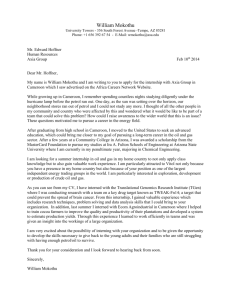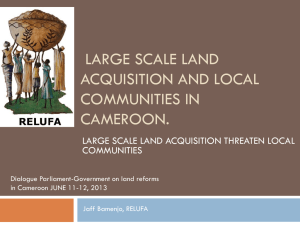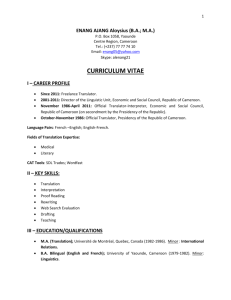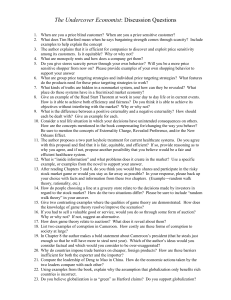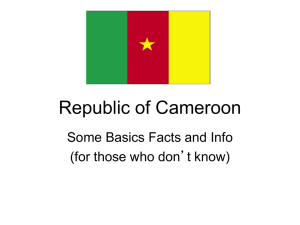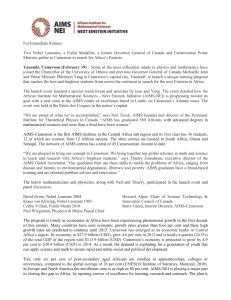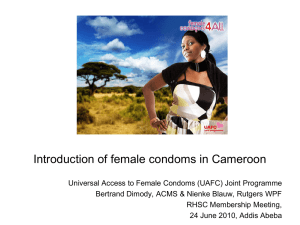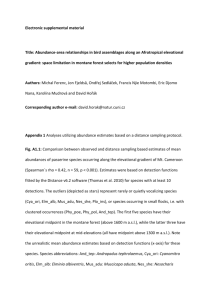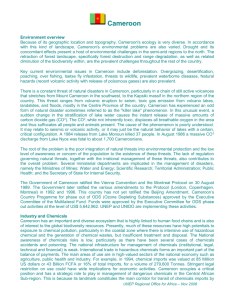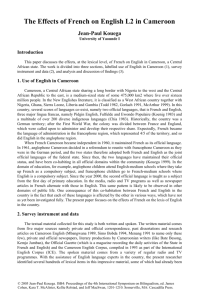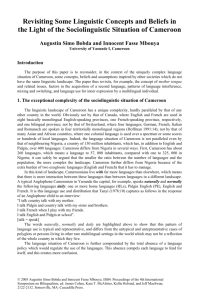ssecond univ 112
advertisement
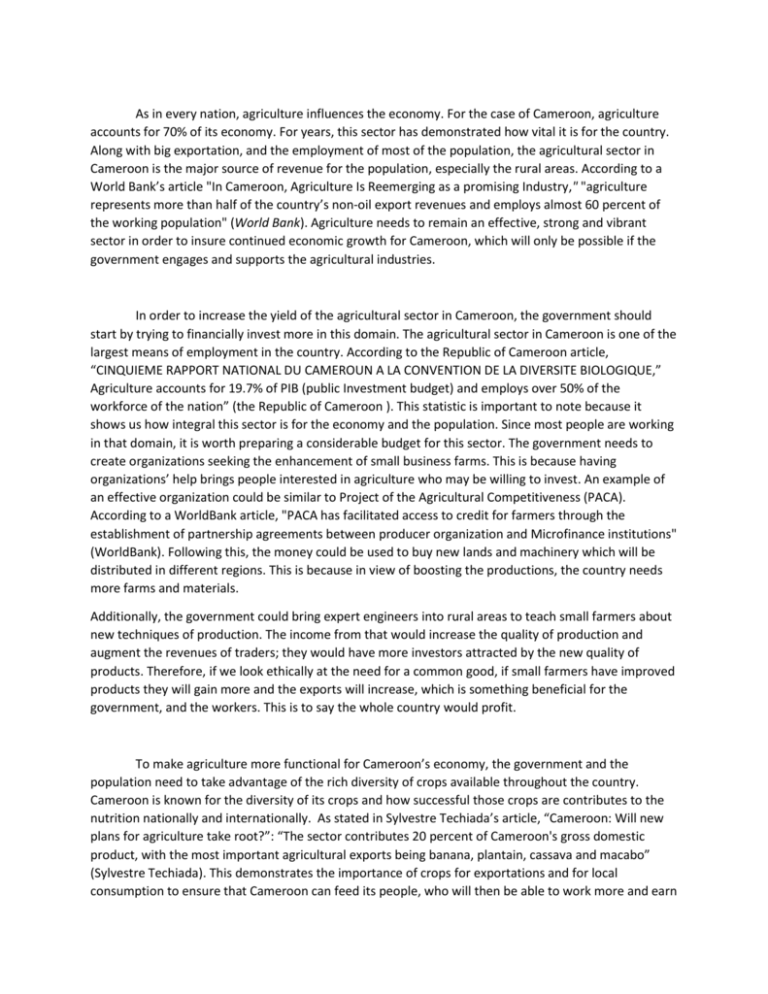
As in every nation, agriculture influences the economy. For the case of Cameroon, agriculture accounts for 70% of its economy. For years, this sector has demonstrated how vital it is for the country. Along with big exportation, and the employment of most of the population, the agricultural sector in Cameroon is the major source of revenue for the population, especially the rural areas. According to a World Bank’s article "In Cameroon, Agriculture Is Reemerging as a promising Industry," "agriculture represents more than half of the country’s non-oil export revenues and employs almost 60 percent of the working population" (World Bank). Agriculture needs to remain an effective, strong and vibrant sector in order to insure continued economic growth for Cameroon, which will only be possible if the government engages and supports the agricultural industries. In order to increase the yield of the agricultural sector in Cameroon, the government should start by trying to financially invest more in this domain. The agricultural sector in Cameroon is one of the largest means of employment in the country. According to the Republic of Cameroon article, “CINQUIEME RAPPORT NATIONAL DU CAMEROUN A LA CONVENTION DE LA DIVERSITE BIOLOGIQUE,” Agriculture accounts for 19.7% of PIB (public Investment budget) and employs over 50% of the workforce of the nation” (the Republic of Cameroon ). This statistic is important to note because it shows us how integral this sector is for the economy and the population. Since most people are working in that domain, it is worth preparing a considerable budget for this sector. The government needs to create organizations seeking the enhancement of small business farms. This is because having organizations’ help brings people interested in agriculture who may be willing to invest. An example of an effective organization could be similar to Project of the Agricultural Competitiveness (PACA). According to a WorldBank article, "PACA has facilitated access to credit for farmers through the establishment of partnership agreements between producer organization and Microfinance institutions" (WorldBank). Following this, the money could be used to buy new lands and machinery which will be distributed in different regions. This is because in view of boosting the productions, the country needs more farms and materials. Additionally, the government could bring expert engineers into rural areas to teach small farmers about new techniques of production. The income from that would increase the quality of production and augment the revenues of traders; they would have more investors attracted by the new quality of products. Therefore, if we look ethically at the need for a common good, if small farmers have improved products they will gain more and the exports will increase, which is something beneficial for the government, and the workers. This is to say the whole country would profit. To make agriculture more functional for Cameroon’s economy, the government and the population need to take advantage of the rich diversity of crops available throughout the country. Cameroon is known for the diversity of its crops and how successful those crops are contributes to the nutrition nationally and internationally. As stated in Sylvestre Techiada’s article, “Cameroon: Will new plans for agriculture take root?”: “The sector contributes 20 percent of Cameroon's gross domestic product, with the most important agricultural exports being banana, plantain, cassava and macabo” (Sylvestre Techiada). This demonstrates the importance of crops for exportations and for local consumption to ensure that Cameroon can feed its people, who will then be able to work more and earn more. Consequently, in order to exploit this diversity, the Cameroonian government will need to care about all the regions/ provinces in the country that offer different types of crops. To do that, they should cultivated land in poor regions that are not used because usually regions are left behind although they can be a source of production (Kouebou et al). On example of acting in this direction will be to exploit the biodiversity of fruit available in the North of the country. According to Kouebou et al, in their article “Biodiversité et valeur alimentaire des fruits au Cameroun: observations préliminaires dans le Département de la Bénoué” (Région du Nord). This part of the country has been neglected. The article claims that this region possesses varieties of fruits but is ignored for big production because of the bad weather conditions and the poverty there. From this point of view, it will be important to regard this province as useful for production. Further, more help should be provided to this region to use this diversity as an engine to improve its agricultural production. However, even with intense exploitation, this diversity will remain available if there are plans to protect the environment and lands that are used for agricultural production. Such plans can include public speeches about the issue to make the population be aware of the importance of that protection. Another example to approach this point can be show in Kouebou et al. article “Biodiversité et valeur alimentaire des fruits au Cameroun: observations préliminaires dans le Département de la Bénoué (Région du Nord)” where is it stated that “Sustainable agriculture for us is a necessity, and is based on many concrete achievements, such as cultivating crops among the trees in the southern provinces to prevent further encroachment of the desert”(Kouebou et al.). Thereby, to be able to keep practice on those farmlands, the government and the population needs to set methods that will permit the future usage of those. Consequently, not only will it be effective for a future production and increasing amount of exportation, but the gain from that protection will be profitable for everyone in the country. Those profits can include better living conditions, and the use of money from exportations to invest in other sectors such education, health, and many others. As Cameroon’s agriculture is regarded as significant for its economy, in view of keeping it stable, many problems such as corruption should also be taken care of. Exportations constitute the principal revenues in Cameroon. According to Valantine Achancho article “Review and analysis of national investment strategies for agricultural policies in Central Africa: The case of Cameroon*”In: Rebuilding West Africa’s Food Potential,” “The dessert banana production is more developed in Cameroon, where it contributes to nearly 30 billion XAF in export revenues” (Valantine Achancho.) With this reference, it can be justified that agriculture brings a massive amount of money. Unfortunately, large quantities of those proceeds are not even used to enrich the sector, and nobody knows where does that money goes or how it is used. The sector has many issues that can be solved using that money. Some issues can be reported by the World Bank article where it is stated that “If you add to that poor climatic conditions transport and storage problems and political corruption, you've got (a picture of) the bulk of the problems Cameroonian farmers must endure”( World Bank). Examining this statement we can see that there is a real issue that needs to be resolved. Therefore, one way to fight against corruption will be to use transparency because it is important for the population to see where the money goes. By doing that people stealing will fear and will think a little more before they commit that crime. Another way will be to replace people who hold their jobs for years in the agricultural ministry and were not even qualified for that position. That will start by breaking the network of people working with each other to embezzle. In addition to that, increasing salaries for people holding high level jobs can help reduce corruption since people with low salaries are the most vulnerable to steal. Hence, ethically thinking, if those action are taken, the money gain from agriculture will be used for a common good. I will permit workers and the government to have more revenues. However, some may say that investing in small business farms is not beneficial for the economic. It’s true that supporting small farms can slow the economic since there will be a lot work there before they bring a considerable revenue. But let’s recall that, even though it will take time to make those small business powerful, in the future they will be as strong as bigger companies of production. This is why we have to think at future results and be optimistic. Nevertheless, some might think that cultivate lands in poor regions are too expensive. We cannot deny that target the most productive regions is efficient for the production; but ignore poor regions can be and handicap for the sector and the economic. Cultivate lands in poor region is expensive but it worth. Since we are looking for ways to maintain agriculture effective for the economic, it worth to invest in poor regions now than later because the benefit from than will come later and will help future generation. Later on, if this recommendation is apply, those regions will feed themselves and neighborhood countries, they will have more profit on production and future generation will gain from that. This is why working on poor regions now is so vital. Likely, some may add that transparency can lead to more corruption. Personally, even though in some cases it could allow some people to misappropriate, I think it will be almost impossible for people to steal money if everything are shared to the public. They will worry about their image and since not everybody are not bad, good people employees will readily catch bad ones. In sum, agriculture in Cameroon is strongly are contributing to its economic vitality and will still do so in the future if the government reacts properly to improve the sector. As the above stated, financial support will be adjustment in the restyling small business farms. The use of the country’s resources and the protection of lands will assure future cultivation. And the application of transparency will contribute to prevention corruption and embezzlement. Hence, with those recommendations, the country will start being in the right path for a brilliant economy and a future common welfare.
